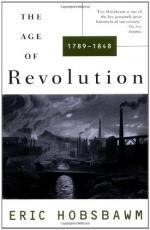
|
| Name: _________________________ | Period: ___________________ |
This quiz consists of 5 multiple choice and 5 short answer questions through Ideology: Religion.
Multiple Choice Questions
1. How did Hobsbawm characterize the change in the way that people related to the land, and the way land was related to the economy?
(a) As the least recognized phenomenon of the period.
(b) As the most catastrophic phenomenon of the period.
(c) As the least forgivable development of the period.
(d) As the most lucrative development of the period.
2. How were the working classes influenced by religion after the French Revolution?
(a) The were less influenced by it than before.
(b) They found consolation in the church for their hard lives.
(c) They relied on it as another social service.
(d) They remained tithed to the church.
3. What was the consequence of French land reforms in North Africa, in Hobsbawm's account?
(a) They created a discontented class of people who eventually revolted.
(b) They installed local officials as a new aristocracy.
(c) They brought civilization to North Africa for the first time.
(d) They stripped away the wealth of the North African countries.
4. What did the land have to be turned into before it could be developed economically, in Hobsbawm's opinion?
(a) A commodity that could be bought and sold.
(b) Farmland again, after years of being battefields.
(c) Feudal domains.
(d) A tamed beast.
5. What was changing in the role religion played in people's lives, in Hobsbawm's account?
(a) It was expanding into poor neighborhoods.
(b) It was becoming merely ceremonial.
(c) It was in general decline.
(d) It was becoming more radical.
Short Answer Questions
1. What motive does Hobsbawm say would have to motivate the new owners of the land, if the land were going to develop economically?
2. Why, according to Hobsbawm, did land reform take place in France?
3. What was abolished in the wake of Napoleon's victories?
4. In Hobsbawm's account, what did the peasantry gain by land reforms sweeping the globe in the mid-1800s?
5. How does Hobsbawm describe the traditional system of agriculture?
|
This section contains 359 words (approx. 2 pages at 300 words per page) |

|




